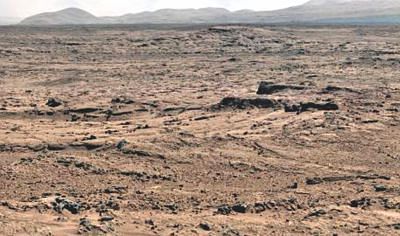Why we're mad for Mars

This panorama is a mosaic of images taken by the Mast Camera (Mastcam) on NASA's Mars rover Curiosity.
An excited comment by a NASA scientist set off a bout of feverish online speculation last week about what new discoveries might be coming from the surface of Mars.
John Grotzinger, the principal investigator for NASA's Mars Curiosity rover mission, told an NPR reporter that the rover's soil sampler analysis had turned up something exciting.
"This data is gonna be one for the history books," he said. "It's looking really good."
Populate Mars!
The comments kicked off immediate online speculation on what the finding could be, but NASA immediately began to manage expectations, with a spokesperson telling CBS News that the discovery was "nothing earthshaking."
But try as it might, NASA likely can't tamp down enthusiasm about the Red Planet. Earth's neighbor has long fascinated the public for its potential to have a history of life, or even to one day support a future human colony.
The lure of Mars
Until the first spacecraft flybys of Mars in the 1960s, scientists believed the planet might have liquid water and sustain life. That possibility was enough to fascinate the public, Bob Crossley, author of "Imagining Mars: A Literary History" (Wesleyan, 2011),told LiveScience in August.
"Somewhere deep in my own psyche, and maybe for other people as well, there is a desire for another world," said Crossley, an emeritus professor of English at the University of Massachusetts.

 For all latest news, follow The Daily Star's Google News channel.
For all latest news, follow The Daily Star's Google News channel. 



Comments